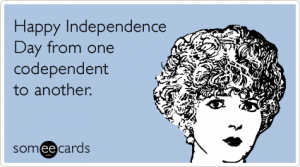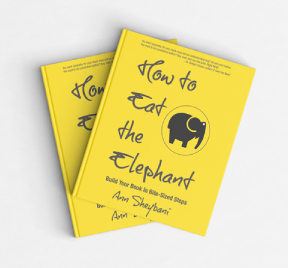Writing
The Girl in the Plastic B-Bubble
May 27, 2013
This is a guest post by the world famous boundary expert, Bridget Cooper. Well maybe not world famous. Yet. But hold on.
When you have boundary issues it’s a huge challenge to figure out what is your baggage and what belongs to someone else. You either blame others for all the problems in your life or you take on everybody’s troubles as if they were your own.
You want more happiness and less stress? It comes down to the simplest task: creating boundaries. Letting other people own their “stuff” while you own yours.
When you have firm boundaries you can sit back and observe as others run around you in a state of utter craziness. Imagine the power! You don’t feel the crazy. You don’t try to fix the crazy. (You may try to open the window to let some crazy out, or maybe comment on the crazy to make sure that you’ve done your part to demonstrate your awareness of the dance.) You hear the music, but your feet stay still. You can resist taking on drama that does not belong to you. You can resist trying to repair others or their situation. You recognize that they must be meeting some need to continue with this ridiculous behavior. But you feed your needs in other ways, so you can just watch without entering the fray.
Have you ever seen someone with a strong sense of Mine vs. Yours? Who stands there and just observes without participating?
Before I got the hang of boundaries, I thought people like that – who stayed “detached” and out of the drama – must be drugged, numbed out to the world. Now I am the one considered suspect.
At one holiday function my sister asked me what I was “on” because I was so calm. She couldn’t understand that I was high on boundaries. I was in what I have affectionately come to call my “B-Bubble” (pronounced “Buh Bubble” for those audio book lovers out there).
Like being in an impenetrable bubble, when I’m in my B-Bubble, the crazy, anxiety-provoking, maddening behavior that others display just bounces right off the surface and isn’t allowed into my mental space. I’m a very visual person, so sometimes I revel in imagining their craziness ricocheting off the Plexiglas, and splashing back onto them.
Perhaps you would like to use this tactic. Change the first letter of B-Bubble to the first letter of your name (“J-Bubble” or “E-Bubble,” for example). Imagine their chagrin when what others thought was going to burst your bubble flies right back at them?
It’s strangely satisfying to experience other people having to hold their own anxiety and negative behaviors, and not taking them on you. And it’s surprisingly soothing for those around you; I have learned this for myself.
Awhile back, I was at a dress rehearsal for my daughters’ dance recital. One of the other moms, wrecked with anxiety and worry, approached me hoping to commiserate. Thrown off center by all of the demands and the perfectionist dance instructor, she was floored by my calm. I shared my B-Bubble concept with her. She loved it, of course, because she’d exhausted herself with mental and emotional gymnastics.
Holding my own boundaries calmed her. I didn’t add to her anxiety by letting her feelings affect my own. I didn’t build her worry tower taller. I didn’t offer her any bricks, just calm.
Now, before you go thinking that I come from a long line of Buddhists, let me set the story straight. I won’t go into the details of my early years, but suffice it to say that I thought everything and everyone existed in a life-sucking, emotional interdependence. Where others ended and I began was a foreign concept to me–as incomprehensible as walking upside down on the ceiling. I was the poster child for co-dependency for a long, long, LONG time.
So now I reap a great deal of satisfaction from being able to resist jumping in and trying to fix everything.
I say, “Oh” a lot. As in, “Oh, you seem upset.” Or, “Oh, you look mad about that.” And, “Oh, you seem bothered by what’s going on.”
What did I used to say? Things like: “I’m sorry, I didn’t mean to do that.” Or, “I’m sorry, what can I do to fix that?” And, “You poor thing, what can I give you to make you feel better?” (Do you recognize yourself?)
On the surface, these may seem like caring things to say. And they are. But only if you’re not taking on the responsibility for making others feel better. That’s on them. That is their job to own.
Healthy relationships are like that: You own your stuff and I own mine. And we talk about the acreage in the middle, the common ground that joins us together. I don’t try to squish myself into your bubble or suck you into mine. We are individuals, with unique experiences and feelings and thoughts. I don’t own yours, and you don’t own mine. You can be upset, and I don’t have to fix it. I don’t have to assume responsibility for your hurt or anger. I can (and must), however, if it’s partly mine. Under no circumstances do I claim responsibility in order to make you feel better. That does you absolutely no favors.
Ready to get in your Bubble? It’s really cozy in here. And smells so much better than a cesspool of drama.
Nose plug or boundaries: it’s your pick.
To read more from Dr. Bridget Cooper, check out her website: Pieces In Place
The above is an excerpt from her upcoming book, Feed The Need (2013) I’ll want you to buy lots and lots of copies because Bridget will probably want to make me feel really good by giving me, like, 75% of the profits. That’s just the way she r-rolls.
4 Comments
Leave a Reply
You must be logged in to post a comment.







Bridget R-Rocks!!!!
😉 Love you both!
She seriously does. Now she just has to learn how to be really generous. By giving me all of the proceeds to her upcoming book.
Bridget R-Rocks!!!!
😉 Love you both!
She seriously does. Now she just has to learn how to be really generous. By giving me all of the proceeds to her upcoming book.